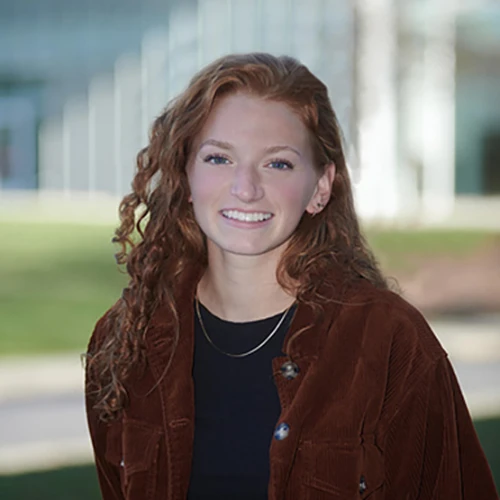Angie Genter
SLP Student Finds Success
To be a licensed speech-language pathologist, students need to complete an undergraduate degree, a master’s degree in Communication Sciences and Disorders, pass a Praxis exam, complete 400 hours of supervised clinical hours, and complete a nine-month clinical fellowship. On average, it takes between six to seven years to complete.
While averages apply to most, students like Angie Genter are the exception. The first-year graduate student is enrolled in Marywood University's five-year Speech-Language Pathology (SLP) program.
Marywood offers an accelerated SLP program that allows students to earn a Bachelor’s degree in Communication Sciences and Disorders during the first three years, and a Master’s degree in Speech-Language Pathology in the final two years. Under the supervision of a licensed and certified speech-language pathologist and within the University’s on-campus clinic, SLP majors develop practice ready skills from direct contact with clients of all ages. Students learn how to treat patients with speech, language, and communication disorders related to autism, articulation, voice, reading, traumatic brain injury, Down's Syndrome, Parkinson’s Disease, stroke, and concussion.
“Marywood’s on-campus clinic is an added benefit that many schools don’t have,” said Genter. “The convenience of having a working clinic right on campus is nice. I have real relationships with my professors that I wouldn’t find in other schools.”
Genter was recently awarded the Undergraduate Scholarship from the Northeastern Speech-Language-Hearing Association of Pennsylvania (NESHAP). The $1,000 scholarship is awarded to a full-time matriculating student who demonstrates academic excellence and involvement in the field of speech-language pathology or audiology during undergraduate studies. NESHAP is a professional organization consisting of speech-language pathologists, audiologists, speech, language and hearing scientists, and educators of the hearing impaired within Northeastern Pennsylvania. Its mission is to promote the interests of and provide the highest quality services for professionals in the field, and advocate for people with communication disabilities.
Genter was among a small number of Marywood graduate students who joined Dr. Vijayachandra Ramachandra, Associate Professor in the Department of Communication Sciences and Disorders, at the 14th Annual Meeting of the Society of the Neurobiology of Language in Philadelphia. The group presented their research titled "Oink and Moo Lead to a Right Spatial Bias: The Influence of Iconicity on Line Bisection." The Society for the Neurobiology of Language is an NIH-funded non-profit organization whose goal is to advance the understanding of the neurological basis of language.
Genter is also a student-athlete, a role she takes seriously. Her dedication to both school and athletics is something to behold. She’s a recipient of the NFHCA Scholar of Distinction; NFHCA Division III National Academic Squad; Dr. Jane Farr Award for Excellence in Field Hockey; Atlantic East Offensive Player of the Week (10/4); and Atlantic East Academic Honor Roll. In a 5-1 victory over Delaware Valley University in 2021, Genter tied the Marywood University Women’s Field Hockey single-game points record. With a hand in all five of Marywood’s goals, she finished with three goals and two assists for eight points.
“I chose Marywood because it provided the perfect balance,” said Genter. “I wanted to go somewhere that offered an accelerated speech program. I could have gone with a few different options, but Marywood stood out. Going to a big school seems daunting to me, especially for someone like myself who wants to play a sport and be in a specialized program.”
